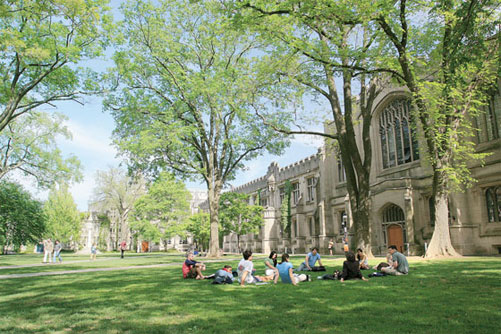OSHCstudents – Prospective international students should research majors, minors and double majors before studying in Europe.
Having completed a bachelor’s degree in the U.S. – where she majored in both cross-cultural studies and theology and religious studies – Vietnamese student Thi Ngoc Nu Nguyen says she wasn’t aware that she had to declare a major when applying as an undergrad to a European university.
Nguyen wanted to strengthen her biblical language skills before pursuing a master’s degree but did not know what major to select. With guidance from staff at the Faculty of Theology and Religious Studies at the Catholic University of Leuven in Belgium, she opted for a one-year abridged bachelor’s in theology and religious studies at the school.
Prospective international undergraduate students considering European universities may have some confusion about how degree programs work at those schools, including how and when to select a major, minor or double major. Here are answers to three questions international applicants may have.
1. When do I select a major?
Policies vary at different European universities. Most universities in the United Kingdom, for example, require all students to select their major when they apply, though Scotland allows flexibility in major selection during a student’s first and second year of study.

Contact the admissions office to find information on academic requirements at European universities. (GaudiLab/Getty Images)
Chloe Heerman, coordinator at the educational policy office at the Catholic University of Leuven, says international students must select a major “the moment they apply for admission.” However, at Sorbonne University in France, major selection comes later
“In the Faculty of Science and Engineering, students choose a first-year survey program, with three to four science disciplines to ensure that students have a larger context in the sciences. At the end of the first year, students choose their major and their minor,” Katherine Tyrka, who handles international press relations for Sorbonne, said via email.
Tyrka says this program structure will be expanded throughout the Faculty of Arts and Humanities as well.
The University of Amsterdam in the Netherlands offers prospective domestic and international undergrads help with picking a major, which they must choose when they apply. Twice a year, the school has “open days,” such as the upcoming Bachelor’s Day on March 10, where students can attend information sessions and chat with students and advisers about the programs that interest them, says Stefanie van Gelderen, the university’s marketing and communications adviser for international programs.
For prospective international students who cannot attend in person, there are also online webinars and a livestream recording of the open days, van Gelderen says.
2. Do I need a minor?
Prospective international students can also consider choosing a minor to give them extra knowledge of a specific subject and potentially make them more competitive in the global job market.
At Leiden University in the Netherlands, students can choose to do a minor in the third year of any three-year bachelor’s degree program, says Caroline van Overbeeke, the school’s spokesperson for corporate communication.
“The benefit is to have flexibility to follow other interests or choose a topic complementary to their study to deepen their understanding in the field,” van Overbeeke says.

In the U.K., an increasing number of universities, such as the University of Southamptonand the University of Liverpool, offer the option of a major and minor, where students devote 75 percent of time to their major subject and 25 percent to their minor.
British-American undergrad Annie Button is an arts and sciences major at University College London. Although UCL does not offer minors, she says the way her specific degree program is set up, she essentially chooses a “major” either on the arts or sciences side and then a “minor” from the other category.
David Allen, an international education consultant who runs the U.K.-based Univisits Ltd., says students do not need a minor but if they choose to pursue one, then it would be noted on the diploma.
“In the U.K., courses are written either with ‘and’ or ‘with’ to denote a double major or major/minor, respectively,” Allen says.
3. Should I double major?
Prospective international students can consider double majoring if they equally like two subject areas. This means students study two areas of focus but still graduate with a single degree.

Darja Lisjak, head of public relations at the University of Ljubljana in Slovenia, says students can enroll in a degree program that can either be dedicated to a single discipline or two disciplines, similar to a double major.
“In the U.K. we have programs called ‘dual honors’ or ‘joint honors’ that you might say is like a double major or major/minor,” Alex O’Craik, senior liaison and recruitment officer for University College London, said via email. O’Craik says students in these degree programs take the same number of credits as those in a single major program, leading to a bachelor’s degree.
At the University of St. Andrews in Scotland, Sophia Rommel from Hong Kong is pursuing an M.A., joint honors, in international relations and philosophy – a four-year Scottish bachelor’s degree. She says she chose the school because it offered options for combining studies. The school’s flexible degree structure was also appealing.
“I could change my subjects, even my degree, during my first two years of studies if I were to find that the M.A. wasn’t what I expected,” Rommel says.
Having now experienced both the American and European university systems, Nguyen says while it may be initially confusing, prospective international students should take advantage of all available resources, especially admissions and department staff contacts at European universities.
“You will always have people who are there to help you find your way,” Nguyen says.
Emma (OSHCstudents) – According to USnews






































